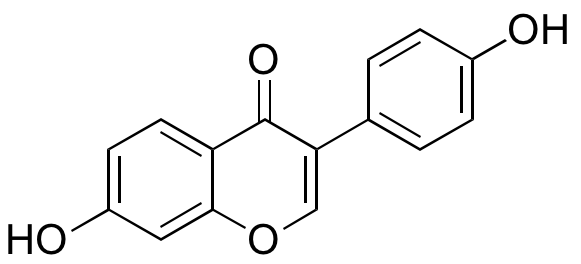Description
Daidzein is a phytoestrogen and isoflavone initially found in various plant sources, including soybeans. Daidzein exhibits pro-fibrotic, anti-inflammatory, anticancer chemotherapeutic, neuroprotective, immunomodulatory, anti-osteoporotic, anti-resorptive, anti-obesity, and antioxidative activities. Daidzein increases collagen synthesis and inhibits collagen degradation in fibroblasts by activating TGF-β/Smad signaling. In vivo, daidzein decreases TNF-α-induced lung inflammation, expression of Cxcl2, activation of NF-κB, and activity of PARP-1. In hepatic cancer cells, daidzein induces apoptosis, increases cytochrome c release and activation of caspases 3 and 9, and decreases cellular proliferation. In other in vitro models, daidzein increases neurite growth by increasing activity of PKC, ERK, and Src. In vivo, daidzein decreases ovariectomy-induced increases in CD4+ T cell levels; it also increases CD28+ T cell levels, decreases RANKL expression, and suppresses osteoclast formation. This compound inhibits adipogenic differentiation by increasing lipolysis in vitro. In vivo, daidzein increases levels of superoxide dismutase, catalase, glutathione, glutathione peroxidase, and glutathione-S-transferase, inhibiting DMBA-induced breast cancer development.
